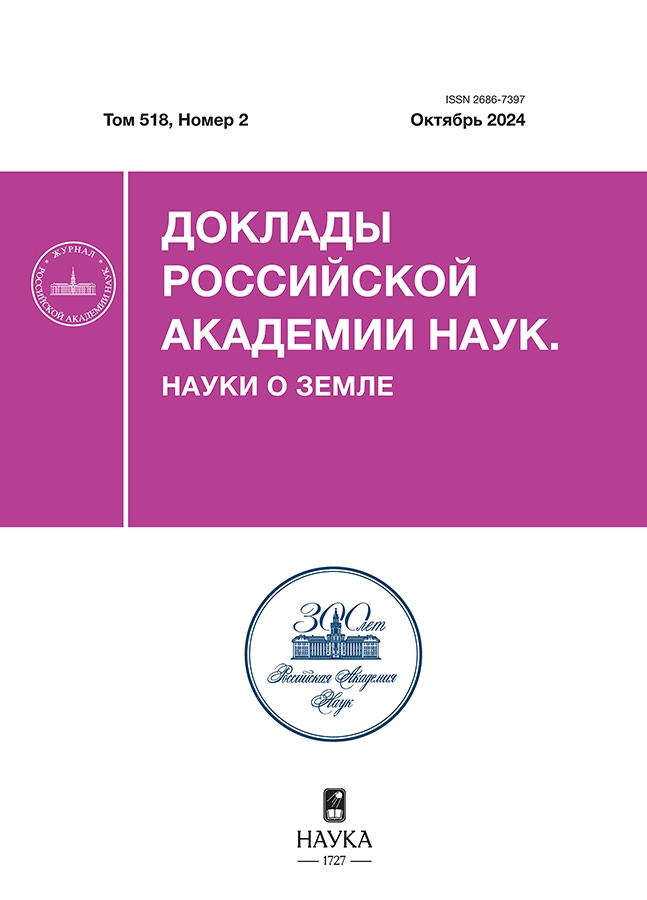New Vision of Со2 Content in the Surface Waters of the Black Sea According to Direct Measurements
- Authors: Konovalov S.K.1, Orekhova N.A.1
-
Affiliations:
- Marine Hydrophysical Institute of the Russian Academy of Sciences
- Issue: Vol 518, No 2 (2024)
- Pages: 335-342
- Section: OCEANOLOGY
- Submitted: 31.01.2025
- Published: 15.12.2024
- URL: https://edgccjournal.org/2686-7397/article/view/649913
- DOI: https://doi.org/10.31857/S2686739724100155
- ID: 649913
Cite item
Abstract
Pioneer results of high-precision direct determination of CO2 in the surface waters of the Black Sea have been presented in this paper. This data has made possible high precision characteristics of the content and intra-annual variations of CO2. The average annual value of pCO2 is 436 µatm, which is higher than the average annual value of the near sea surface atmosphere (420 µatm). The analysis of seasonal variability has revealed about 30% decrease in sea water pCO2 from late spring to autumn. The minimum values of pCO2 are detected in January – February, the maximum ones in July. Seasonal variations in the CO2 content in the near sea surface atmosphere have revealed an inverse relationship – with maximum values in February and minimum values in July. This indicates different mechanisms of the CO2 evolution in the air and seawater. Seasonal variations in the intensity of burning organic carbon, as external sources, influence the content of CO2 in the atmosphere. Variations in temperature and the state of the carbonate system, as abiotic factors, govern pCO2 in water. In the summer-to-autumn period, pCO2 is governed by a combination of abiotic and biotic factors – variations in temperature and intensity of production and transformation of organic matter. The ratio of abiotic to biotic factors varies from season to season, but abiotic factors remain primary throughout the year.
Keywords
Full Text
About the authors
S. K. Konovalov
Marine Hydrophysical Institute of the Russian Academy of Sciences
Email: natalia.orekhova@mhi-ras.ru
Corresponding Member of the RAS
Russian Federation, SevastopolN. A. Orekhova
Marine Hydrophysical Institute of the Russian Academy of Sciences
Author for correspondence.
Email: natalia.orekhova@mhi-ras.ru
Russian Federation, Sevastopol
References
- Feely R. A., Sabine C. L., Takahashi T. et al. Uptake and storage of carbon dioxide in the ocean: The global CO2 survey // Oceanography. 2001. 14(4). P. 18–32.
- Friedlingstein P., O’Sullivan M., Jones M.W. et al. Global carbon budget 2023 // Earth Syst. Sci. Data. 2023. 15. 5301–5369. https://doi.org/10.5194/essd-15-5301-2023
- Takahashi T., Sutherland S.C., Sweeney C. et al. Global sea-air CO2 flux based on climatological surface ocean pCO2, and seasonal biological and temperature effects // Deep-sea Research Part I: Topical Studies in Oceanography. 2002. 49. P. 1601–1622. https://doi.org/10.1016/S0967-0645(02)00003-6
- Zeebe R. E., Wolf-Gladrow D. CO2 in seawater: equilibrium, kinetics, isotopes. The Netherlands: Elsevier. Oceanogr., 2001. 65. 360 p.
- Millero F. J. The marine inorganic carbon cycle // Chem. Rev. 2007. 107. P. 308–341. https://doi.org/10.1021/cr0503557
- Cai W.-J., Xu Y.-Y., Feely R. A. et al. Controls on surface water carbonate chemistry along North American ocean margins // Nature Communications. 2020. 11. 2691. https://doi.org/10.1038/s41467-020-16530-z
- Makkaveev P. N. Dissolved inorganic carbon in the ocean and climate // Water Resources. 2013. 40(7). P. 677–683. https://doi.org/10.1134/S0097807813070075
- Востоков С. В., Лобковский Л. И., Востокова А. С. и др. Сезонная и многолетняя изменчивость фитопланктона в Чёрном море по данным дистанционного зондирования и контактным измерениям хлорофилла // ДАН. 2019. Т. 485. №1. C. 99–103. https://doi.org/10.31857/S0869-5652485199-103
- Ковалёва И. В., Суслин В. В. Интегральная первичная продукция в глубоководных районах Черного моря в 1998–2015 годах // Морской гидрофизический журнал. 2022. Т. 38. № 4. С. 432–445. https://doi.org/10.22449/0233-7584-2022-4-432-445
- Vostokov S. V., Vostokova A. S., Vazyulya S. V. Seasonal and long-term variability of coccolithophores in the Black Sea according to remote sensing data and the results of field investigations // J. Mar. Sci. Eng. 2022. 10. 97. https://doi.org/10.3390/jmse10010097
- Bates N. R. Seawater carbonate chemistry distributions across the Eastern South Pacific Ocean sampled as part of the GEOTRACES project and changes in marine carbonate chemistry over the past 20 years // Front. Mar. Sci. 2018. 5. 398. https://doi.org/10.3389/fmars.2018.00398
- Bauer J. E., Cai W.-J., Raymond P. A. et al. The changing carbon cycle of the coastal ocean // Nature. 2013. 504. P. 61–70. https://doi.org/10.1038/nature12857
- Иванов В. А., Белокопытов В. Н. Океанография Черного моря. Севастополь: Морской гидрофизический институт, 2011. 212 с.
- Bakan G., Büyükgüngör H. The Black Sea // Marine Pollution Bulletin. 2000. 41(1–6). P. 24–43. Mhttps://doi.org/10.1016/S0025-326X(00)00100-4
- Моисеенко О. Г., Коновалов С. К., Козловская О. Н. Внутригодовые и многолетние изменения карбонатной системы аэробной зоны Черного моря // Морской гидрофизический журнал. 2010. 6. С. 42–57.
- Hiscock W. T., Millero F. J. Alkalinity of the anoxic waters in the Western Black Sea // Deep-Sea Research II. 2006. 53. P. 1787–1801. https://doi.org/10.1016/J.DSR2.2006.05.020
- Glazer B. T., Luther G. W., Konovalo, S. K. et al. Spatial and temporal variability of the Black Sea suboxic zone // Deep-sea Research II. 2006. 53. P. 1756–1768. https://doi.org/10.1016/J.DSR2.2006.03.022
- Konovalov S. K., Murray J. W., Luther III G. W. Basic processes of Black Sea biogeochemistry // Oceanography. 2005. 18(2). P. 24–35. https://doi.org/10.5670/oceanog.2005.39
- Хоружий Д. С. Использование приборного комплекса AS-C3 для определения парциального давления углекислого газа и концентрации неорганического углерода в морской воде // Экологическая безопасность прибрежной и шельфовой зон и комплексное использование ресурсов шельфа. 2010. 23. С. 260–272.
Supplementary files












